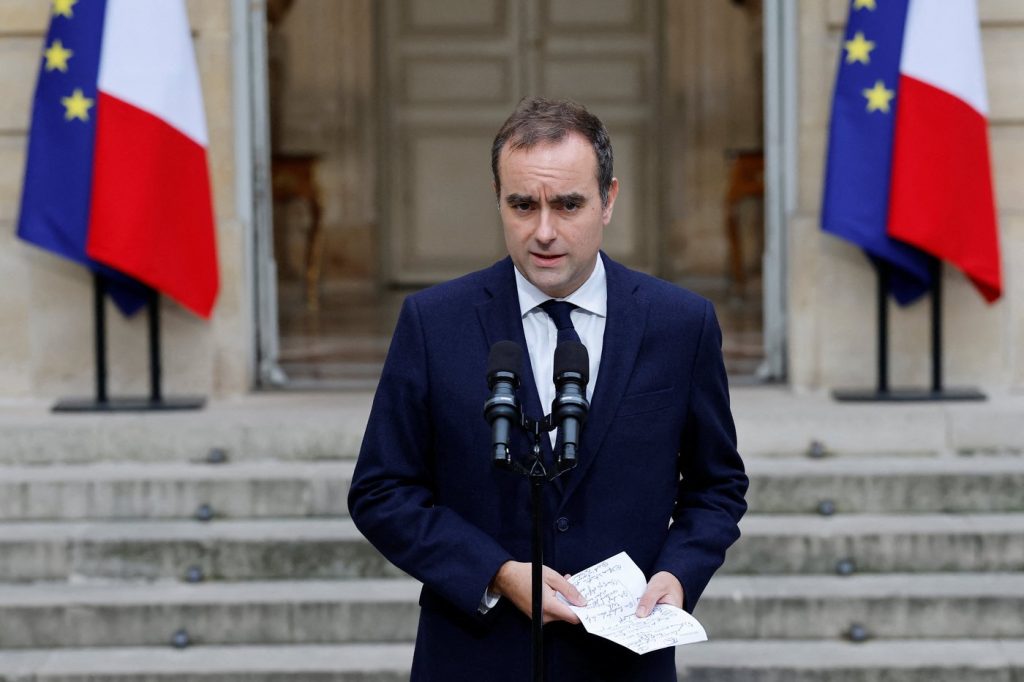PARIS (AP) — Outgoing French Prime Minister Sébastien Lecornu resigned on Monday, just a day after announcing his ministers, triggering a significant political crisis in France. President Emmanuel Macron accepted Lecornu's resignation and set a tight deadline of 48 hours for him to engage in discussions with political parties to stabilize the situation.
This short timeframe aims to provide Macron with an opportunity to weigh his options following Lecornu's departure. As political debates intensify regarding how Macron might respond to this crisis, attention turns to how he plans to address the political instability that has unfolded since Lecornu's government announcement. The delicate coalition between Macron's centrists and the conservative party quickly fell apart, leaving them unable to garner the necessary parliamentary support to pass the crucial 2026 budget.
Lecornu made efforts to invite all political factions for discussions; however, far-right leaders Marine Le Pen and Jordan Bardella from the National Rally party rejected the invitation, instead calling for snap elections. The far-left party France Unbowed also decided to boycott the talks.
The French constitution grants extensive powers to the president, including the appointment of the prime minister. Despite political vulnerabilities, the president still has significant authority over foreign policy, European matters, and international treaty negotiations. He also serves as the commander-in-chief of the armed forces.
With Macron's approval ratings sinking to unprecedented lows, he has not publicly indicated his next steps should Lecornu fail to secure a resolution. Observers suggest his options may be limited to either calling new elections, appointing a primeminister from outside his political camp, or resigning altogether.
One possible course of action discussed is appointing a prime minister from another political party, which could facilitate a form of political cohabitation. Bruno Retailleau, leader of the Republicans, along with the Socialist, Greens, and Communist parties, have advocated for this approach. Retailleau expressed that he would only consider joining a new cabinet under such circumstances.
The left-wing coalition, known as the New Popular Front, won the most seats during the 2024 French legislative election, although it did not achieve a majority and later splintered due to infighting. Under a cohabitation scenario, the prime minister would govern with parliamentary backing while the president would retain authority mainly over foreign and defense policy.
Calling snap elections is another option available to the French president. Macron has previously dissolved the National Assembly to call elections, but this approach carries the risk of exacerbating existing divisions. Following the last European elections, the National Rally gained substantial ground, leading to a fragmented Assembly consisting of over 320 seats held by the far-right and left, while centrists and conservatives controlled around 210 seats. Despite the improbability of winning an outright majority, the National Rally perceives snap elections as a valuable opportunity for consolidating power.
Lecornu expressed hope on Wednesday morning that a compromise could be reached to resolve the crisis and avert new elections, citing a shared desire to secure a budget for France by December 31. He interpreted this shared objective as a momentum towards reducing the likelihood of parliamentary dissolution.
The possibility of Macron resigning, while unlikely, cannot be entirely ruled out. His second term is scheduled to conclude in May 2027, and he has consistently stated that he will not resign. Should his stance change, the Constitutional Council would declare a vacancy, and the Senate president would assume interim powers, leading to a new presidential election within 35 days. On the far left, Jean-Luc Mélenchon’s France Unbowed has called for Macron's resignation. More surprisingly, former Prime Minister Édouard Philippe, once a close ally of Macron, has suggested that the president should consider stepping down and call for early elections after the adoption of the 2026 budget.
Since the establishment of the Fifth Republic in 1958, only one French president, Charles De Gaulle, has resigned following a failed referendum in 1969.











